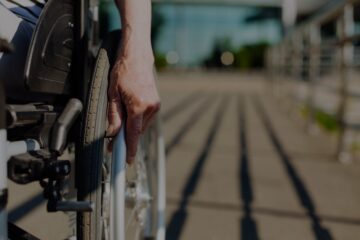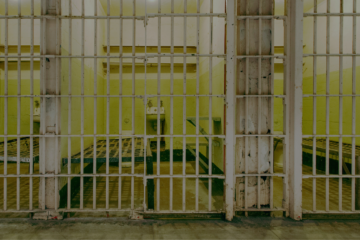by Ellie Heffernan, writing for the “When All Are Counted” Project
At 25 years old, lifelong West Virginian Rebekah James has broken a bone more than 30 times. James has Osteogenesis Imperfecta Type I, a chronic illness also known as “brittle bone disease.”
Growing up, James had to travel to multiple different states just to see doctors with expertise treating her condition. Even then, it was hard always being “the girl in the cast” who had to sit out during gym class. And when it was time to go to college, she turned down a full scholarship to study theater at West Liberty University, worried the physically demanding career would take too much of a toll on her health.
But while James’ disability has made life harder in many ways, her experiences have also inspired her to speak up.
“I want to raise awareness for not only my bone disease, but what it's like to live with an invisible illness. And to be in a state that doesn't necessarily have the best health care system. Because it's really difficult to find that specialty care. I didn't really feel heard by any of the doctors about the chronic pain that I was experiencing in my adult life as well,” James said.
James is not the only West Virginian with a disability who has struggled to access vital care. And that’s not surprising given that the state has fewer specialty physicians and mental health providers per resident than the national average. With fewer providers, many people with disabilities linger on waitlists, travel out of state for care, or leave West Virginia for good.
State officials and nonprofit organizations are working to address this problem by growing the state’s healthcare workforce. And achieving that goal often starts by collecting better data.
Nonprofit grassroots advocacy group Mountaineer Autism Project recently wrapped up a project to collect better data regarding a common autism therapy: Applied Behavior Analysis (ABA).
Although ABA can be used to treat other conditions, it is often used to help people with autism learn new skills, including how to play and communicate with others.
There aren’t enough ABA providers in West Virginia, so Mountaineer Autism Project’s end goal, in this case, was developing a state plan to grow this workforce. But doing so required figuring out baseline data: How many professionals were currently providing ABA? How many people were on their caseloads? And how many children who needed ABA could actually access it?
“There was no data available on that, and so we had to develop the surveys,” said Jill Scarbro, Mountaineer Autism Project’s vice president and CEO and owner of her own ABA clinic. “Even getting the contact information for the behavior analysts in the state, there wasn’t a good source. We had to dig and find those contacts to get them the survey information.”
In the end, Mountaineer Autism Project found very few West Virginia children with autism have access to ABA–roughly 4%.
Throughout the state, ABA providers have long waitlists, full of families who want access to this service. Scarbro's clinic, Bright Futures Learning Services, has to turn away approximately four out of every five families that contact them seeking services.
Families with the financial means often leave West Virginia because their children can’t get the care they need, Scarbro said. In the past several years, her clinic has helped six families move out of state.
“They didn’t want to leave. And they were all honestly kind of heartbroken that this was the choice they had to make that was in the best interest of their children,” Scarbro said.
For West Virginia’s poorer families, accessing services for people with disabilities usually means spending time on waitlists for Medicaid waivers.
Sara, who works as a case manager, helping folks who use Medicaid services, said it can take years to get off these waiting lists. She asked us not to use her last name.
As people with disabilities wait to access the services these waivers provide, including in-home care and personal aids, families often shoulder the burden.
“The family might be in a severe burnout, especially if the person is 18 or 19, and that family member has been waiting to get them professional services for a long time,” Sara said. “Burnout is a nasty thing. It can lead to abuse and neglect in the worst case scenarios, but in general, it just means that person isn’t getting the best quality of care they could get from their provider.”
And even if a family member gets a waiver that covers ABA, there are often more problems to surmount.
“The primary problem is still, even if you qualify and you have the funding, there’s a lack of providers,” Scarbro said. “So, ‘Yay! There’s funding for it, but wait, where are the people that can actually provide the service?’ And so, everything then comes back to workforce.”
But despite the large amount of work West Virginia must do to provide comprehensive, quality care for all people with disabilities, there is room for optimism. Back when Mountaineer Autism Project was founded, fewer than 1.6% of the state’s children with autism were receiving any evidence-based treatment. Since then, the organization has trained new providers and fought to successfully expand insurance coverage of autism services, making it easier for people to access the care they need.
Although Rebekah James isn’t starting a nonprofit, she is also using her voice to make a difference for people with disabilities. And regardless of her chronic pain and other difficulties, she wants to inspire others who struggle with similar feelings and experiences, as she told me in an initial email:
“Despite it all, I have found more self compassion and understanding than ever before through all of this, and I am thankful for even the slightest opportunity to change the future for this disease. I think my story is a great message to share with the world, even if it only impacts just one life.”

Ellie Heffernan a freelance writer drawn to investigating powerful people and the communities they often harm. Her work in newsrooms has taken her from Maryland to North Carolina to West Virginia, covering topics like city and state government, racial equity, education and disability rights. She has written for INDY Week, The Local Reporter, The Daily Record and, most recently, Mountain State Spotlight. Ellie tweets @elliepheffernan.



0 Comments